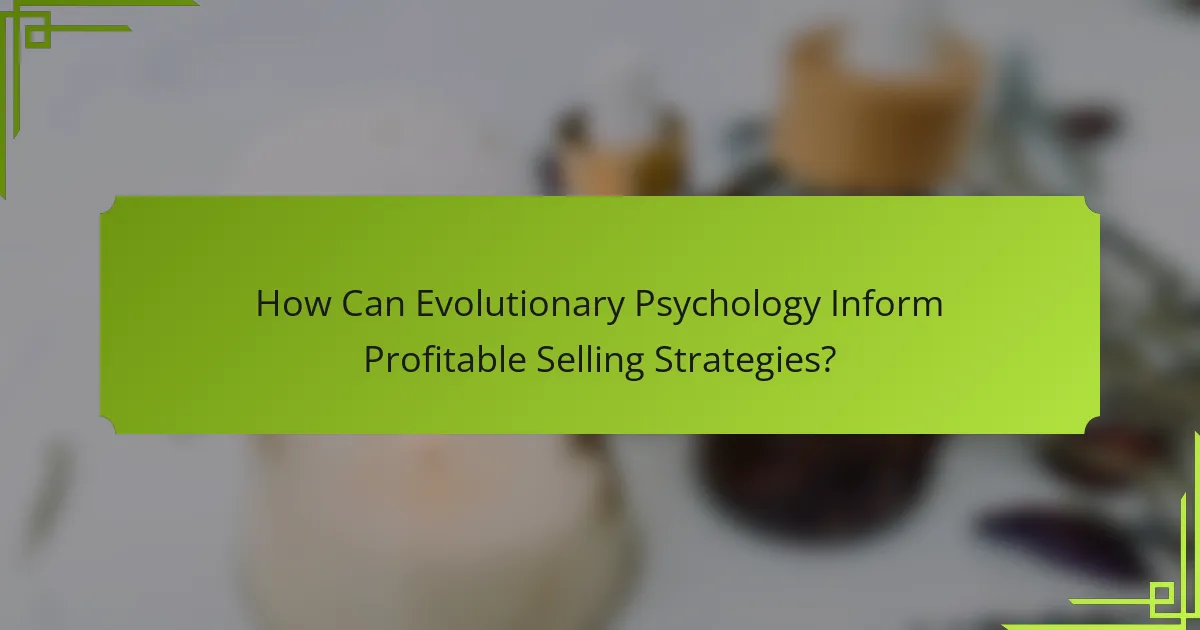Understanding what to sell to make money involves leveraging insights from evolutionary psychology. This approach focuses on innate human behaviors, emphasizing social status and community belonging. It highlights the importance of scarcity and urgency in driving purchasing decisions. Additionally, effective storytelling can enhance engagement and relatability, ultimately increasing profitability.

How Can Evolutionary Psychology Inform Profitable Selling Strategies?
Understanding evolutionary psychology can significantly enhance selling strategies by tapping into innate human behaviors. By recognizing fundamental drives such as survival, social acceptance, and resource acquisition, businesses can tailor their offerings to resonate with consumers on a deeper level.
For instance, products that emphasize social status or community belonging often appeal to evolutionary instincts. This is particularly relevant in luxury goods or brands that promote exclusivity. As a result, marketing messages should highlight how products fulfill these primal needs, creating a stronger emotional connection.
Additionally, leveraging scarcity can drive urgency in purchasing decisions. Limited-time offers or exclusive releases trigger a fear of missing out, activating evolutionary responses that prioritize immediate action.
Finally, understanding the importance of storytelling can enhance engagement. Narratives that align with human experiences and challenges can create a compelling context around products, making them more relatable and desirable.
What are the fundamental principles of Evolutionary Psychology?
Evolutionary psychology is grounded in the principles of natural selection, emphasizing that human behavior is influenced by evolutionary processes. Key principles include the adaptation of psychological traits for survival, the universality of certain behaviors across cultures, and the importance of reproductive success in shaping human motivations. These insights can be harnessed for profitable strategies by understanding consumer behavior and decision-making processes.
How does human behaviour influence purchasing decisions?
Human behavior significantly influences purchasing decisions through psychological triggers. Consumers often rely on emotions, social proof, and cognitive biases when making choices. For instance, scarcity can create urgency, prompting quicker purchases. Additionally, familiarity breeds trust, making recognizable brands more appealing. Understanding these factors allows businesses to tailor marketing strategies effectively.
What role do survival instincts play in consumer choices?
Survival instincts significantly influence consumer choices by driving behaviors aligned with self-preservation and resource acquisition. These instincts create a preference for products that enhance safety, health, and status. For instance, consumers may prioritize organic foods or security systems, reflecting innate desires for well-being and protection. Understanding these instincts allows businesses to tailor offerings that resonate deeply with fundamental human needs. This alignment can increase customer loyalty and boost sales, showcasing the power of evolutionary psychology in marketing strategies.
How do social hierarchies affect buying patterns?
Social hierarchies significantly influence buying patterns by shaping consumer preferences and behaviors. Individuals often align their purchases with the status and values of their social group. For example, higher social status can drive demand for luxury goods, while lower status may prioritize affordability and practicality. This dynamic creates a unique attribute in consumer behavior where aspirational buying becomes prevalent, as consumers seek to enhance their perceived social standing through their purchases. Understanding these patterns allows businesses to tailor their marketing strategies effectively, aligning products with the psychological motivations of different social tiers.

What are the universal attributes of effective products?
Effective products share universal attributes that drive consumer appeal and profitability. These attributes include quality, usability, design, emotional connection, and value for money. Quality ensures durability and reliability, while usability enhances user experience. Design influences first impressions and brand perception. Emotional connection fosters loyalty and engagement. Value for money aligns product pricing with consumer expectations, maximizing satisfaction and repeat purchases.
Which product features resonate with evolutionary instincts?
Products that resonate with evolutionary instincts often emphasize survival, reproduction, and social connection. Features that align with these instincts include scarcity, which triggers urgency; social proof, which fosters trust; and adaptability, which appeals to changing environments. These attributes enhance perceived value and motivate purchasing decisions. For instance, limited-time offers leverage scarcity, while testimonials provide social proof. Products that evoke emotional connections, such as those linked to family or community, also resonate deeply, tapping into our fundamental evolutionary drives.
How does perceived scarcity increase product value?
Perceived scarcity increases product value by enhancing desirability and urgency. When consumers believe a product is limited in availability, they associate it with higher quality and exclusivity. This psychological trigger often leads to quicker purchasing decisions. Scarcity can be leveraged through marketing strategies such as limited-time offers or exclusive editions, amplifying the perceived value of the product. As a result, businesses can capitalize on this principle to drive sales and increase profit margins.
What are the benefits of social proof in marketing?
Social proof enhances marketing effectiveness by building trust and credibility among consumers. It leverages the psychological tendency of individuals to look to others for guidance on purchasing decisions. This approach can increase conversion rates, improve brand loyalty, and foster community engagement. By showcasing testimonials, reviews, and user-generated content, brands can effectively influence potential customers and drive sales.

What unique attributes can differentiate a product in the market?
Unique attributes that can differentiate a product in the market include innovative features, superior quality, and exceptional customer service. These elements create distinct value propositions that resonate with consumers. For example, a product with a unique design may attract attention, while enhanced durability can build trust. Additionally, personalized experiences can foster customer loyalty, making the product stand out. Emphasizing these attributes can leverage insights from evolutionary psychology to appeal to fundamental human motivations, thereby increasing market competitiveness.
How can storytelling enhance product appeal?
Storytelling enhances product appeal by creating emotional connections with consumers. Engaging narratives can highlight a product’s unique attributes, such as its benefits and origins, fostering relatability and trust. This approach taps into evolutionary psychology, leveraging our innate preference for stories over mere facts. As a result, products become more memorable and desirable, ultimately driving sales and customer loyalty.
What makes a product emotionally compelling?
Emotional appeal in products stems from their ability to connect with consumers’ desires and values. Products that evoke feelings of belonging, security, or self-expression tend to be more compelling. For example, brands that tell stories or create relatable experiences often resonate deeply with their audience. Understanding these emotional triggers can enhance marketing strategies and boost sales, making products not just items but symbols of identity and aspiration.
Which psychological triggers can boost sales?
Emotional triggers significantly boost sales by influencing consumer behavior. Scarcity creates urgency, prompting quicker purchasing decisions. Social proof, such as testimonials, enhances trust and credibility. Reciprocity encourages purchases through perceived obligation after giving value. Authority figures can sway opinions and drive sales through endorsements. Finally, consistency leads to repeat purchases by reinforcing brand loyalty.
How does the concept of reciprocity influence consumer behaviour?
Reciprocity significantly influences consumer behavior by creating a sense of obligation to return favors or benefits received. This principle drives consumers to engage with brands that offer free samples or gifts, leading to increased sales. Research indicates that consumers are more likely to purchase from brands that have previously provided them with something of value. This dynamic enhances customer loyalty and encourages repeat purchases, making reciprocity a powerful tool in marketing strategies.

What are the rare attributes that can create a competitive edge?
Rare attributes that create a competitive edge include understanding consumer behavior, leveraging cognitive biases, and tailoring products to emotional triggers. These insights enable businesses to connect deeply with customers, enhancing loyalty and driving sales. For instance, products that evoke nostalgia can outperform standard offerings. Additionally, utilizing scarcity and urgency in marketing can significantly boost conversion rates. By focusing on these rare attributes, businesses can differentiate themselves in crowded markets.
How can niche markets leverage evolutionary insights?
Niche markets can leverage evolutionary insights by understanding consumer behavior rooted in psychological principles. By tapping into innate human motivations, such as social belonging or survival instincts, businesses can create products that resonate deeply. For example, products that emphasize community or sustainability can attract consumers seeking connection and purpose. This alignment with evolutionary psychology enhances market appeal and drives profitability.
What unique selling propositions attract specific demographics?
Unique selling propositions that resonate with specific demographics include personalization, social proof, and emotional appeal. Personalization attracts consumers seeking tailored experiences, enhancing engagement. Social proof, such as testimonials, appeals to those valuing community validation. Emotional appeal connects deeply with demographics prioritizing values and identity. Understanding these aspects can drive targeted marketing strategies.
What innovative strategies can be derived from evolutionary psychology?
Innovative strategies derived from evolutionary psychology focus on understanding human behavior to create appealing products. By leveraging insights into innate desires, businesses can tailor offerings that resonate deeply with consumers. For instance, emphasizing social status can drive demand for luxury items. Additionally, utilizing scarcity and urgency can enhance perceived value, motivating quicker purchasing decisions. Understanding these psychological triggers allows for effective marketing strategies that align with human instincts, ultimately leading to increased profitability.

How can one apply these insights for immediate profit?
Identify products that align with human psychological triggers to generate immediate profit. Focus on items that evoke emotions, fulfill basic needs, or enhance social status. For instance, selling health-related products can tap into the innate desire for well-being. Leverage scarcity and urgency in marketing to drive quick sales. Utilize social proof by showcasing testimonials or endorsements to build trust. Tailor offerings to specific consumer segments based on their psychological profiles for higher conversion rates.
What are best practices for integrating psychological principles into sales?
Integrating psychological principles into sales enhances customer engagement and boosts conversions. Focus on understanding consumer behavior through evolutionary psychology.
Utilize scarcity and urgency to create a sense of value, encouraging quicker purchasing decisions. Highlight social proof by showcasing testimonials and reviews to build trust.
Employ storytelling techniques to connect emotionally with customers, making the product relatable. Tailor messaging to address specific pain points and desires, enhancing relevance and appeal.
Lastly, create a seamless purchasing process, minimizing friction to reduce abandonment rates. These practices leverage psychological insights for increased profitability.
What common mistakes should be avoided when applying these strategies?
To maximize the effectiveness of strategies based on evolutionary psychology, avoid common mistakes such as neglecting audience understanding, ignoring emotional triggers, and failing to test hypotheses. Misalignment with consumer motivations can undermine potential profits. Prioritize clarity and relevance in your messaging.
How can continuous learning enhance selling effectiveness?
Continuous learning significantly enhances selling effectiveness by equipping sales professionals with up-to-date knowledge and skills. This adaptability allows them to understand customer needs better and tailor their approaches accordingly. For instance, utilizing insights from evolutionary psychology can reveal buyer motivations and decision-making processes. As a result, sales strategies become more aligned with consumer behavior, leading to increased conversions. Moreover, ongoing training fosters confidence and resilience, essential traits for navigating the dynamic sales landscape. Continuous learning ultimately transforms sales techniques into more impactful and profitable engagements.
